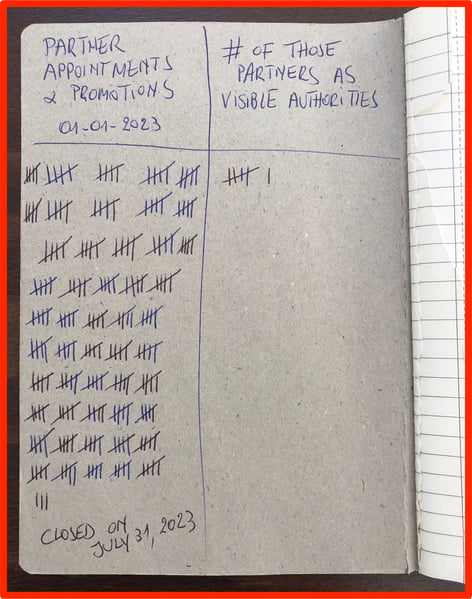
Why Are Consultancies Appointing New Partners Without a Voice?
.jpg?width=56&name=francescorizzato8%20(1280px).jpg)
In a world dominated by the clamor of opinions, where authority is often equated with the volume of one's voice, a curious phenomenon unfolds behind most boutique consultancies' closed doors.
A silent majority is rising to power, a cohort of newly appointed partners who, perplexingly, have no discernible voice in their market. Their LinkedIn profiles are eerily quiet, their expertise domains, if detectable, are not connected to any leading voice, and their authority seems invisible to the naked eye.
This raises a perplexing question: Why are existing owners/partners of consultancies appointing such new co-owners or partners who seemingly have no visible authority?
There’s no scientific evidence that explains this phenomenon, so I decided to anecdotally turf new partner appointments I get noticed of via several European consulting publications & announcements.
Here are the flabbergasting statistics (by the way, I only checked the mid-market consultancies; no big consulting firms, but their 'problem' is similar):
- I got notified of 253 boutique consultancy partner or co-owner appointments from January 1st till July 2023 (I stopped turfing after July 31)
- I checked out their profiles via the website and social media, and only 6 of those 253 could be considered as ‘Visible Authorities’ in their expertise domain, industry or market.
- Out of those 6, only 2 were real champions. The other 4 were doing ‘quite OK’.

Picture: The inside flap of my notebook - counting the partner appointments in boutique consultancies - January till July 2023
A real champion?
A real champion is someone who not only possesses deep expertise in their expertise domain, industry, or market but also actively contributes to the discourse, influences trends, and shapes the future of their field. They are thought leaders sought after for their insights, regularly publish articles or reports that are widely read and cited and receive invitations to speak at industry conferences and events. Their authority is not just visible; it is acknowledged and respected by their peers, clients, and competitors alike.
In a world where everyone is vying for attention, real champions are the ones whose voices rise above the noise and make a lasting impact.
Recommended reading: (Case Study) Replicate the Secret of This Highly Profitable Consultancy
Consultancy owners must set the right example
Let’s return to my statistics: 98% of consultancy owners have nothing to say. Their LinkedIn is ‘empty’.
I am always fascinated by the overwhelming majority choosing not to build up their reputation for domain expertise. How will their prospects start to trust them and the expertise of their consultancy? Trust is a crucial element for winning projects and retaining clients. And trust needs to be proven – 'being a partner' or years of experience in the field will not cut it.
I see consultancy owners posting all sorts of useless hodgepodge on LinkedIn – “Look at these pictures of the weekend in the forest we spent as a team and how awesomely it showcases our company’s culture” type.
Or the consultancy pays for a few monthly LinkedIn ads that nobody clicks on because they are purely promotional (like all other thousands) and not educational, not inspirational.
Here’s the thing. Nobody cares about these weekends, apart from the team (hopefully). Nobody clicks on these ads because of dumb slogans like ‘we unleash the power of your digital transformation’ (which we see hundreds of per week).
Most consultancy owners I speak to aspire to be respected authorities. They are dreaming of establishing high demand for their consultancy’s expertise and services. Yet, they refuse to invest time into sharing with prospects their leading thoughts. They don’t think that client education is a priority.
That’s some contradictory logic. You can’t have one without the other.
And suppose owners of consultancies don’t invest time and energy into growing their reputation as undeniable subject matter authorities. In that case, they, of course, do not have these expectations of consultants that they promote to partners.
Recommended reading: 5 Reasons Consulting Leaders Are Missing the Digital Train
It’s not about the lack of time – it’s about the wrong mindset!
"Luk, I don't have time to educate my audience".
Most consultancy owners, partners, and leaders keep telling me that. If I had a penny…
Let me be straightforward: the honest answer is that they don't prioritise it. And in the long run, that’s a risky decision in a trust-based consulting space.
“When consulting business owners say they don’t have time, they are essentially saying: I don’t want to prioritise sustainable business growth and standing out in the market so I can command premium pricing. Without educating your audience, you will never be able to communicate why you are different and worth buying and be on top of the minds of your ideal buyers once they have the need. (Vladimir Blagojević)”
Senior leaders, owners, or partners in a consultancy are the most influential voices to consistently share their leading thoughts on the (specific) expertise of the consultancy.
If they don’t consider this a priority, they will soon be outplayed by their expertise-rich competitor with an abundance of ‘trust stuff’: inspirational, openly shared experiences and leading thoughts.
High-performing consultancies took note of the massive shift in how business development in consulting works these days. They understand that they can’t go back and play by the old rules. They generously share their knowledge and drive business development by educating their target audience. They are diligently producing thought leadership that goes to the heart of problems their target audience experiences.
Result? They have prospects knocking on their doors. They don’t have to compromise on pricing or submit 20-page proposals to win a bid. Their target market is already aware of this consultancy's high level of expertise because their leaders – owners and partners – are highly reputable authorities in the field.
Pitching against such a competitor is a hell of a job!
Recommended reading: Without Thought Leadership, Consultancies Will Fail
Connecting with the C-level
The ultimate success of a boutique consultancy hinges on its ability to forge long-term relationships with clients and position itself as a trusted advisor. This connection is most crucial at the C-level, perhaps even with the CEO, as these are the decision-makers who shape the future of their organizations.
However, this trust is not easily earned. C-level executives are inundated with information and offers from all directions, and to cut through the noise, a consultancy partner must demonstrate not only expertise but also thought leadership.
How can a CEO or C-level executive consider a consultancy partner as a trusted advisor when there is no evidence of leading thinking from that partner?
In a world where a partner's leading thinking is a key currency of trust, the lack of any visible authority from that specific partner can be a significant barrier to forming meaningful, long-term relationships with clients.
Growth in consulting is rooted in audience education
Here is a message I suggest every boutique consultancy owner and partner internalize: growing a consultancy business, like it or not, is rooted in educating your audience. Consultancies will always struggle to grow sustainably and profitably if that's not a priority.
I want consultancy owners who say they don’t have (read: make) time for this to hear me clearly: audience education is a business P-R-I-O-R-I-T-Y.
Sharing the experiences and educating the target audience IS THE JOB OF CONSULTING LEADERS.
No deep audience education? Consulting prospects and existing clients will turn to a 'leading-thinker-competitor' (according to recent research, as much as 72%!).
And a few quick and dirty chatGPT posts will not cut it – they will just become a part of the noise!
Leading thinkers in consulting are fearless with their content. They write original, fresh content that inspires and educates. They convey their deep expertise with their ability to identify patterns, address specific pain points, predict trends, and offer practical advice.
I urge consultancy owners and leaders to start educating their buyers, showing them best practices, and giving them unique and valuable tips for success. ChatGPT has no clue about that.
By openly sharing expertise, consultancy owners and leaders send a message that they are not afraid to reveal their expertise because they are confident in their skills and knowledge. It sends a powerful message their consultancy has much more to offer because of how freely the firm’s leaders share their knowledge.
Consultants who get promoted to partners are expected to step in the shoes of rainmakers. However, that’s simply not feasible without these consultants having a solid reputational footprint for excellence in expertise! What do these firms expect these newly minted partners to do? Pull out a yellow book and start dialling? Or send hundreds of automated direct messages via LinkedIn all of a sudden (that nobody replies to)?
For those starting from scratch, here’s how the journey unfolds over time:
- In the beginning, there’s the work OR the client's education.
- Later, it becomes the work AND the client's education.
- Ultimately, the client's education BECOMES the work.
In conclusion
I write daily on Linkedin - it's the source of 80% of new business opportunities.
Writing every day doesn't just fill pages – it ignites my intellectual evolution, making me a sharper thinker and a better advisor to my consultancy clients!
Writing daily causes my brain to see ideas everywhere throughout the day. It’s the cross-pollination between my advisory work and capturing ideas, pain points, challenges, processes, methodologies, successes, outcomes, failures, objections, questions, answers, market & technology trends, etc., all day long.
Effortlessly! Really.
Sharing expertise IS my work! I wouldn't be where I am today without writing and speaking.
I hope every single consultancy owner internalizes the modern reality of business development – those who do not have time to educate their audience will find themselves racing to the bottom and competing on pricing.
Sharing expertise is THE priority. And that should be expected from those getting partner promotions or appointments in any sort of consultancy.
Interested in receiving all my learnings to build a better consultancy?
Subscribe to my newsletter.
.jpg?width=66&name=francescorizzato8%20(1280px).jpg)
Luk’s extensive career in the consulting business, which spans more than 20 years, has seen him undertake a variety of influential positions. He served as the European CHRO for Nielsen Consulting (5,000 consultants in the EU), founded iNostix in 2008—a mid-sized analytics consultancy—and led the charge in tripling revenue post-acquisition of iNostix by Deloitte (in 2016) as a leader within the Deloitte analytics practice. His expertise in consultancy performance improvement is underlined by his former role on Nielsen's acquisition evaluation committee. After fulfilling a three-year earn-out period at Deloitte, Luk harnessed his vast experience in consultancy performance improvement and founded TVA in 2019. His advisory firm is dedicated to guiding consulting firms on their path to becoming high-performing firms, drawing from his deep well of consulting industry expertise and financial acumen.

